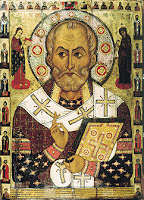This morning, I delivered
presents to children for our church’s Angel Tree ministry. In case you are unfamiliar with this
ministry, it is a program for low-income children (some churches do it for
children of prisoners) to receive Christmas presents. It’s a charitable and sentimental thing
to do for the community and they invited me to come, so I thought it would help
me get into the Christmas spirit.
Part of the experience for
the kids is that someone from the school district dresses up like Santa and the
kids get all excited and they get their picture taken with him. Now I have hang-ups with the whole
Santa narrative. As someone who
isn’t a parent I am afforded the luxury of looking down my nose at parents who
go to so much trouble to deceive their children into believing a story about a
man in a red suit that goes down their chimney and runs a sweatshop of little
people in the middle of the Arctic.
It gets even more obnoxious when Santa somehow has omniscient seeing
powers and judges the behavior of all the children of the world and rewards
them accordingly. I digress.
 But as I sat there this
morning watching this larger than life mascot, of the Christmas season, bring
smiles to the faces of underprivileged children, it struck me. I believe it was because for the first
time I saw Santa Clause in his natural habitat, outside of the disgusting
consumer whoredom that is the mall in December.
But as I sat there this
morning watching this larger than life mascot, of the Christmas season, bring
smiles to the faces of underprivileged children, it struck me. I believe it was because for the first
time I saw Santa Clause in his natural habitat, outside of the disgusting
consumer whoredom that is the mall in December.
When you take Santa out of
the mall, when the church takes back the Santa Clause, and tells his story our
way; not as an unlimited supplier of consumerism, but rather as a true hero of
Christian charity, we have something truly incarnational for our children to
love. Santa Clause isn’t the enemy
of Christmas; he’s the icon of Advent.
Tomorrow is the feast day of
St. Nicholas, you know the guy who the guy in the red suit is based off
of. He was a 4th
century bishop in Myra, an ancient Greek town in modern day Turkey. He was famous for putting coins in the
shoes of poor children and advocating for the rights of prisoners. Furthermore, one of his greatest tales
was a time when he gave money to three young virgins in order to keep them out
of prostitution.
You see Saint Nick is doing
exactly what John the Baptist commanded, “I am the voice of one crying in the
wilderness, make straight the way of the Lord (John 1:23).” This is the mantra of Advent, to
prepare a way for Jesus.
But what is that way
exactly? And why do we have to
prepare, can’t God just do God stuff?
If we remember the song Mary sang when she found out she was going to
birth the God-child (from Luke’s Gospel), we are reminded of God’s way:
The Magnificat
My soul proclaims the greatness of the Lord,
my spirit rejoices in God my Savior
for he has looked with favor on his lowly servant.
From this day all generations will call me blessed:
the Almighty has done great things for me,
and holy is his Name.
He has mercy on those who fear him
in every generation.
He has shown the strength of his arm,
he has scattered the proud in their conceit.
He has cast down the mighty from their thrones,
and has lifted up the lowly.
He has filled the hungry with good things,
and the rich he has sent away empty.
He has come to the help of his servant Israel
for he has remembered his promise of mercy,
the promise he made to our fathers,
to Abraham and his children for ever.
 |
| St. Nick being like, 'hey, put down that sword' |
There are two things to note
here. 1) What God’s promise looks
like: the hungry are fed, the lowly are lifted up, the oppressors are brought
to justice. 2) He has come to the help
of his servant
Israel. God isn’t magic, God works
with God’s people to
bring justice and peace to the broken creation. Because it is our job to set things to right! God has our back, God will sustain us
and guide us, but we as God’s people are ultimately the ones who’s job it is to
make peace in this world.
Advent is the season to
remind us our responsibility. The
baby Jesus was the gift who came and showed us the way, however, we must prepare that way.
I believe Saint Nick is a
faithful example. Remember that
the true meaning of this holiday season is Christian charity, because charity,
self-sacrifice, for the benefit of those who may not deserve it, is the way of
the Lord. So this Advent as we
wait for the Lord, let us follow the way of St. Nicholas. Rejoice…
…Santa Clause is coming to
town…to show us the way to Jesus.
Peace on earth and good will
toward people!
Shalom










